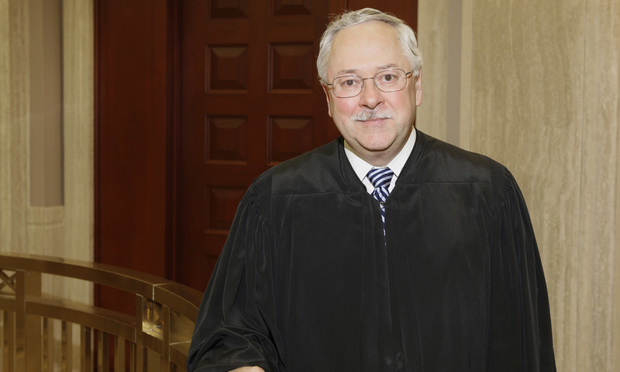Lawyer Sanctioned After Employment Discrimination Lawsuit Deemed Frivolous
A law firm representing the county estimates that taxpayers paid nearly $100,000 to defend the case.
February 11, 2019 at 04:16 PM
5 minute read
 U.S. District Judge Jerome Simandle/Photo: Carmen Natale/ALM
U.S. District Judge Jerome Simandle/Photo: Carmen Natale/ALM
A lawyer who filed an age discrimination lawsuit on behalf of a former Camden police officer has been ordered to pay sanctions for pursuing frivolous litigation.
Cheryl Cooper, a solo practitioner in Sewell, was ordered to pay legal fees to Camden County and several county employees in connection with a lawsuit she filed on behalf of a former Camden police officer. Cooper was sanctioned for failing to withdraw or correct her deficient pleadings even after receiving notice that those claims were not supported by facts.
The amount of the sanctions have not been determined, but the law firm representing the county estimates that taxpayers paid nearly $100,000 to defend the case.
Cooper brought the suit on behalf of John Sosinavage, a former lieutenant in the Camden Police Department. Sosinavage lost his job when that department was disbanded in 2013 and the Camden County Police Department began serving the city.
Sosinavage claimed in his second amended complaint in 2015 that he suffered age discrimination, retaliation for protected First Amendment activity, or both, because he was not invited to apply for employment with the Camden County Police Department while his name appeared on a statewide list of laid-off public employees, known as a “Rice List.” Employers are not obligated to hire from that list, and the Camden County Police Department asserted that it did not do so. Furthermore, the county said Sosinavage never applied for a job with Camden County.
Sosinavage sued Camden County, Police Chief John Thomson, and Deputy Chiefs Orlando Cuevas and Michael Lynch. His suit also named Camden and Louis Vega, a consultant to the Camden Police Department, as defendants. U.S. District Judge Jerome Simandle dismissed the county defendants in May 2018.
The lawyer for the county defendants, Christine O'Hearn of Brown & Connery in Westmont, then moved for sanctions under Rule 11 of the Federal Rules of Civil Procedure and the New Jersey Frivolous Claims Act. Cooper opposed the defense motion for sanctions, arguing “there is no continuing duty on counsel to amend or correct a filing based on after-acquired knowledge.”
But Simandle disagreed with that position, saying that counsel “may not continue to rely on a mistaken factual or legal position if, after discovery, it becomes obvious that such a position is no longer tenable.”
Sosinavage testified at a deposition that he received an application for the Camden County Police Department and instructions on how to apply by email, and that he made a conscious decision not to submit an application to that department, Simandle said. Sosinavage also testified that he told others he did not want to work for the Camden County Police Department, and would not accept a position if he was offered a job there.
“Simply, for more than three years, Ms. Cooper pursued a failure-to-hire case against the County Defendants that she knew or should have known was factually and legally frivolous, despite clear warning of precisely these deficiencies in 2015,” Simandle said.
The frivolous litigation notice by the county defendants included a 21-day safe harbor period in which Cooper could withdraw her claims, but she failed to do so, Simandle said. He called the litigation “the quintessential case that Rule 11 was designed to handle, a suit without proper factual foundation and one that is legally unreasonable.”
The judge ordered counsel for the county defendants to submit an affidavit of their fees and expenses from the day that the second amended complaint was filed on Oct. 9, 2015. Simandle, mindful of Cooper's status as a solo practitioner, said she could submit an affidavit, under seal, addressing her ability to pay. Simandle said he would consider that affidavit when determining the final amount of fees and expenses to award.
Cooper said in an email, “My client and I disagree with the Court's opinion and are disappointed in the finding. However, we respect the Court, and will appeal the ruling to the Third Circuit at the appropriate time.”
A statement from Camden County about the case said, in part, “let this be a transparent message to anyone who thinks the County will settle capricious and frivolous claims. If an attorney overtly abuses taxpayer time and money with no evidentiary basis, the County will contest the claim, and like this case, look for full reimbursement of costs.”
O'Hearn said in an email about the ruling, “This is truly one of the most, if not the most, frivolous case I have been involved in during my 25 years as a practicing attorney. I don't believe there is a more frivolous case, factually or legally, than this case where an individual claimed he was discriminated against when he was not hired, yet he never even submitted an application for employment, stated he made a conscious decision not to apply for employment, and publicly stated he did not want to work for [the] employer.”
This content has been archived. It is available through our partners, LexisNexis® and Bloomberg Law.
To view this content, please continue to their sites.
Not a Lexis Subscriber?
Subscribe Now
Not a Bloomberg Law Subscriber?
Subscribe Now
NOT FOR REPRINT
© 2025 ALM Global, LLC, All Rights Reserved. Request academic re-use from www.copyright.com. All other uses, submit a request to [email protected]. For more information visit Asset & Logo Licensing.
You Might Like
View All

Judge Jablonski and Chief Justice Rabner Both Acted Completely Properly
4 minute read
In 2-1 Ruling, Court Clears Way for Decade-Old Wrongful Imprisonment Suit
5 minute read
Trending Stories
- 1'It's Not Going to Be Pretty': PayPal, Capital One Face Novel Class Actions Over 'Poaching' Commissions Owed Influencers
- 211th Circuit Rejects Trump's Emergency Request as DOJ Prepares to Release Special Counsel's Final Report
- 3Supreme Court Takes Up Challenge to ACA Task Force
- 4'Tragedy of Unspeakable Proportions:' Could Edison, DWP, Face Lawsuits Over LA Wildfires?
- 5Meta Pulls Plug on DEI Programs
Who Got The Work
Michael G. Bongiorno, Andrew Scott Dulberg and Elizabeth E. Driscoll from Wilmer Cutler Pickering Hale and Dorr have stepped in to represent Symbotic Inc., an A.I.-enabled technology platform that focuses on increasing supply chain efficiency, and other defendants in a pending shareholder derivative lawsuit. The case, filed Oct. 2 in Massachusetts District Court by the Brown Law Firm on behalf of Stephen Austen, accuses certain officers and directors of misleading investors in regard to Symbotic's potential for margin growth by failing to disclose that the company was not equipped to timely deploy its systems or manage expenses through project delays. The case, assigned to U.S. District Judge Nathaniel M. Gorton, is 1:24-cv-12522, Austen v. Cohen et al.
Who Got The Work
Edmund Polubinski and Marie Killmond of Davis Polk & Wardwell have entered appearances for data platform software development company MongoDB and other defendants in a pending shareholder derivative lawsuit. The action, filed Oct. 7 in New York Southern District Court by the Brown Law Firm, accuses the company's directors and/or officers of falsely expressing confidence in the company’s restructuring of its sales incentive plan and downplaying the severity of decreases in its upfront commitments. The case is 1:24-cv-07594, Roy v. Ittycheria et al.
Who Got The Work
Amy O. Bruchs and Kurt F. Ellison of Michael Best & Friedrich have entered appearances for Epic Systems Corp. in a pending employment discrimination lawsuit. The suit was filed Sept. 7 in Wisconsin Western District Court by Levine Eisberner LLC and Siri & Glimstad on behalf of a project manager who claims that he was wrongfully terminated after applying for a religious exemption to the defendant's COVID-19 vaccine mandate. The case, assigned to U.S. Magistrate Judge Anita Marie Boor, is 3:24-cv-00630, Secker, Nathan v. Epic Systems Corporation.
Who Got The Work
David X. Sullivan, Thomas J. Finn and Gregory A. Hall from McCarter & English have entered appearances for Sunrun Installation Services in a pending civil rights lawsuit. The complaint was filed Sept. 4 in Connecticut District Court by attorney Robert M. Berke on behalf of former employee George Edward Steins, who was arrested and charged with employing an unregistered home improvement salesperson. The complaint alleges that had Sunrun informed the Connecticut Department of Consumer Protection that the plaintiff's employment had ended in 2017 and that he no longer held Sunrun's home improvement contractor license, he would not have been hit with charges, which were dismissed in May 2024. The case, assigned to U.S. District Judge Jeffrey A. Meyer, is 3:24-cv-01423, Steins v. Sunrun, Inc. et al.
Who Got The Work
Greenberg Traurig shareholder Joshua L. Raskin has entered an appearance for boohoo.com UK Ltd. in a pending patent infringement lawsuit. The suit, filed Sept. 3 in Texas Eastern District Court by Rozier Hardt McDonough on behalf of Alto Dynamics, asserts five patents related to an online shopping platform. The case, assigned to U.S. District Judge Rodney Gilstrap, is 2:24-cv-00719, Alto Dynamics, LLC v. boohoo.com UK Limited.
Featured Firms
Law Offices of Gary Martin Hays & Associates, P.C.
(470) 294-1674
Law Offices of Mark E. Salomone
(857) 444-6468
Smith & Hassler
(713) 739-1250






